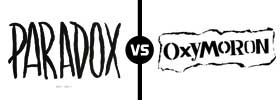English as a Second Language
Stationary vs Stationery
|
The word ‘Stationary’ refers to standing still, or mainly just not moving. Stationery, on the other hand, refers to writing materials, envelopes, office materials, etc. |
Paradox vs Oxymoron
|
An oxymoron is often a set of two or more words that are contradictory in nature, yet somewhat make sense when put together, especially in the common language use of the terms. A paradox, on the other hand,... |
Who vs Whom
|
The term ‘who’ is primarily used to refer to a person and is used a question to ask about that person. It may also be used to give further information about a person, typically one that has been previously... |
Whose vs Who’s
|
Who’s is in fact a contraction of “who is”. Basically, who is gets shortened to who’s. Whose, on the other hand, is the possessive of “who”. It follows the rule similar to his, hers, and theirs. |
Tangible Assets vs Intangible Assets
|
Tangible assets are assets that have a physical presence; they are the assets that can be touched. Intangible assets refer to assets that do not have a physical presence, i.e. they cannot be touched. In order... |













